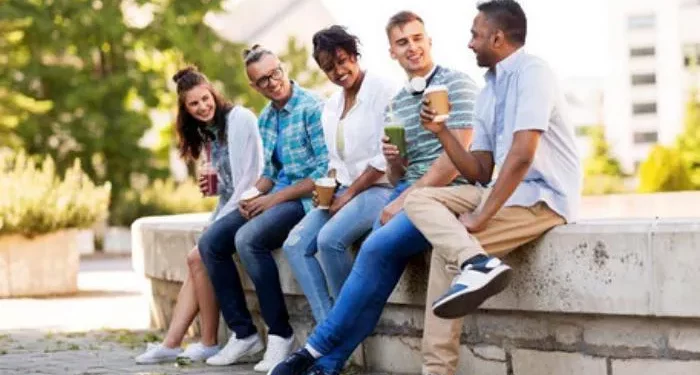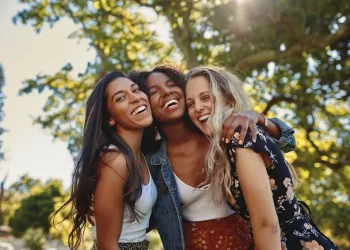Friendship is one of the most important relationships in life. Friends provide support, companionship, and joy. However, many people wonder if close friends can fall in love. This question is complex and can lead to various emotions and outcomes. In this article, we will explore the dynamics of friendship and romantic love, the signs that indicate feelings may have changed, the potential benefits and challenges of transitioning from friends to lovers, and how to navigate this delicate situation.
Understanding Friendship and Love
The Nature of Friendship
Friendship is a bond between individuals based on mutual affection, trust, and support. Friends share experiences, provide emotional support, and enjoy each other’s company. Healthy friendships are built on respect and understanding.
The Nature of Romantic Love
Romantic love, on the other hand, involves deep emotional and physical attraction. It often includes a desire for intimacy and a commitment to one another. Romantic relationships can be passionate and fulfilling but also come with their own set of challenges.
The Spectrum of Relationships
Friendship and romantic love exist on a spectrum. At one end, there are casual acquaintances, and at the other, there are deep romantic partnerships. Close friends often share a strong emotional connection, which can sometimes blur the lines between friendship and love.
Signs That Close Friends May Be Falling in Love
1. Increased Emotional Intimacy
Sharing Personal Feelings
When friends begin to share their innermost thoughts and feelings, it can indicate a deeper connection. If you find yourselves discussing personal issues, dreams, and fears more often, this emotional intimacy may be a sign of growing affection.
Example
A friend who once shared light-hearted jokes may start to confide in you about their struggles or aspirations. This shift can signify a deeper bond forming.
2. Physical Touch
Changes in Physical Interaction
Physical touch is a significant indicator of romantic interest. If you notice that your friend frequently seeks opportunities for physical closeness, such as hugging, holding hands, or sitting close together, it may suggest that their feelings have evolved.
Example
If your friend starts to initiate hugs or touches your arm during conversations, it can be a sign that they are developing romantic feelings.
3. Jealousy
Feeling Protective
If you or your friend starts to feel jealous when the other spends time with someone else, it may indicate deeper feelings. Jealousy can be a strong indicator of romantic interest, as it often stems from a desire to protect the relationship.
Example
If your friend expresses discomfort when you mention spending time with a potential romantic interest, it may suggest that they have feelings for you.
4. Increased Time Together
Desire for More Quality Time
If your friend begins to prioritize spending time with you over other activities, it can indicate that they are developing romantic feelings. A desire to be together more often can signal a shift in the relationship.
Example
If your friend often cancels plans with others to spend time with you, it may suggest that they value your company in a deeper way.
5. Compliments and Flirting
Subtle Signs of Attraction
Flirting and compliments can be signs that a friend is developing romantic feelings. If your friend starts to compliment your appearance or tease you in a playful manner, it may indicate a shift in their feelings.
Example
If your friend tells you that you look great or playfully teases you about a shared experience, it may suggest that they are trying to express their attraction.
6. Talking About the Future
Inclusion in Future Plans
When friends start to include each other in future plans, it can indicate a desire for a deeper connection. If your friend talks about future vacations or life goals that include you, it may suggest that they see you as more than just a friend.
Example
If your friend mentions wanting to travel together in the future or discusses life milestones that involve you, it may indicate that they are considering a romantic relationship.
The Benefits of Falling in Love with a Close Friend
Strong Foundation of Trust
Built-in Trust and Understanding
One of the significant advantages of falling in love with a close friend is the existing foundation of trust. You already know each other well, which can lead to a deeper understanding of each other’s needs and desires.
Example
You may feel comfortable discussing your feelings, fears, and expectations because you have established trust over time.
Shared History
Common Experiences
Close friends often share a wealth of experiences and memories. This shared history can strengthen the bond and make the transition to a romantic relationship smoother. You already have a strong connection that can deepen over time.
Example
Having inside jokes, shared adventures, and mutual friends can create a sense of belonging and intimacy that enhances the romantic relationship.
Emotional Support
Existing Support System
Close friends provide emotional support during challenging times. If you transition into a romantic relationship, this support can continue, allowing both partners to feel secure and understood.
Example
You already know how to support each other during tough times, which can create a strong partnership in a romantic context.
Compatibility
Similar Values and Interests
Friends often share similar values, interests, and lifestyles. This compatibility can make for a strong romantic relationship, as you are likely to enjoy similar activities and have aligned goals.
Example
If you both love hiking, cooking, or watching movies, these shared interests can enhance your romantic relationship.
The Challenges of Falling in Love with a Close Friend
Fear of Losing the Friendship
Risk of Ruining the Relationship
One of the most significant challenges of transitioning from friends to lovers is the fear of losing the friendship. If the romantic relationship does not work out, it can lead to awkwardness and the potential end of the friendship.
Example
You may hesitate to express your feelings because you worry that it could change the dynamic and lead to a loss of the friendship you value.
Misunderstandings
Communication Barriers
Transitioning from friendship to romance can lead to misunderstandings. Both individuals may have different expectations or assumptions about the relationship, which can create tension.
Example
If one person sees the relationship as casual while the other views it as serious, it can lead to hurt feelings and confusion.
Jealousy and Insecurity
Navigating New Emotions
As friends become romantic partners, jealousy and insecurity may arise. These feelings can stem from past experiences or fears of losing the relationship.
Example
If one partner feels insecure about the other’s friendships or interactions with others, it can create tension in the relationship.
Changes in Dynamics
Adjusting to a New Relationship
Transitioning from friends to lovers changes the dynamics of the relationship. It may require both individuals to navigate new roles and expectations, which can be challenging.
Example
You may need to adjust to new ways of communicating and expressing affection, which can take time and effort.
How to Navigate the Transition from Friends to Lovers
1. Open Communication
Discussing Feelings
If you sense that feelings are changing, it’s essential to communicate openly with your friend. Discuss your feelings and ask about theirs. Honest conversations can help clarify intentions and expectations.
Example
You might say, “I’ve been feeling like our friendship has changed, and I want to know how you feel about it.”
2. Take It Slow
Allowing Time for Adjustment
If both of you are interested in exploring a romantic relationship, take it slow. Allow time for adjustment and ensure that both partners are comfortable with the changes.
Example
You might decide to go on casual dates to see how the romantic dynamic feels while still maintaining your friendship.
3. Set Boundaries
Establishing Expectations
Setting boundaries is crucial in a transitioning relationship. Discuss what is acceptable and what is not to avoid misunderstandings and hurt feelings.
Example
You might agree to communicate openly about any concerns or insecurities that arise during the transition.
4. Be Prepared for Change
Accepting the New Dynamic
Understand that the relationship will change, and be prepared for that shift. Embrace the new dynamics and work together to build a strong romantic partnership.
Example
Acknowledge that you may need to navigate new emotions and experiences as you transition from friends to lovers.
5. Prioritize the Friendship
Maintaining the Foundation
Even as you explore a romantic relationship, prioritize the friendship that brought you together. Continue to engage in activities you both enjoy and maintain the connection that initially bonded you.
Example
Make time for fun activities and conversations that remind you of your friendship, helping to strengthen both the friendship and the romantic relationship.
Conclusion
Close friends can indeed fall in love. The emotional intimacy, shared experiences, and existing trust can create a strong foundation for a romantic relationship. However, the transition from friends to lovers can also present challenges, including the fear of losing the friendship and potential misunderstandings.
Recognizing the signs that feelings may have changed is essential. Increased emotional intimacy, physical touch, jealousy, and a desire for more time together can indicate that a friendship is evolving into something deeper.
Navigating this transition requires open communication, patience, and a willingness to embrace change. By discussing feelings, setting boundaries, and prioritizing the friendship, both partners can explore the potential for a romantic relationship while preserving the valuable connection they already share.
Ultimately, every relationship is unique. While some friendships successfully transition into romantic partnerships, others may not. The key is to approach the situation with honesty, openness, and respect for each other’s feelings. Whether the outcome leads to a successful romantic relationship or a deeper friendship, the journey can be a valuable experience for both individuals.
Related topics:





























